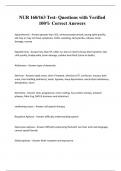Exam (elaborations)
NUR 160/163 Test- Questions with Verified 100% Correct Answers
- Course
- Institution
Hyperthermia - Answer greater than 101, immunocompromised, young spike quickly, old may or may not have symptoms. Chills, sweating, tachycardia, redness, brain damage, nausea Hypothermia - Answer less than 97, older run low so need to know their baseline, kids chill quickly, bradycardia, brain ...
[Show more]



